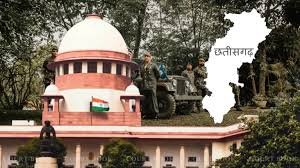Why in the News?
- The Constitution (130th Amendment) Bill, 2025, has been introduced with the stated aim of promoting public interest, welfare, and good governance.
- The bill proposes automatic removal of the Prime Minister, Chief Ministers, or ministers upon arrest or being charged, even before conviction.
- Critics argue that the legislation undermines constitutional principles, presumption of innocence, and India’s federal structure.
Key Highlights:
- Provisions of the Bill
- Ministers, including PM or CMs, will automatically lose their office if arrested or detained for 30 days.
- The removal will occur without a court conviction and is based solely on arrest or filing of charges.
- There is no provision for reinstatement even if the individual is acquitted later.
- Deviation from Existing Legal Framework
- Violates Section 8 of Representation of the People Act (RPA), 1951, which disqualifies individuals only upon conviction.
- Contradicts the principle of innocent until proven guilty, reversing the burden of proof.
- Omits safeguards like a sunset clause, review mechanism, or compensation for wrongful arrest.
- Constitutional amendments
- The Bill will amend Articles 75, 164 and 239AA.
- Article 75 of the Constitution primarily deals with the appointment and responsibilities of the Council of Ministers, including the Prime Minister.
- Article 164 of the Constitution outlines the provisions related to the CoMs in a state.
- The Bill will amend Articles 75, 164 and 239AA.
- Article 239AA of the Constitution outlines special provisions for the NCT of Delhi.
- Constitutional Contradictions
- Breaches Articles 75, 164, and 239AA, which vest removal powers in the President or Governor on the advice of the PM/CM.
- Contravenes Articles 14, 19, and 21, which guarantee equality before law, personal liberty, and due process.
- Violates judicial precedents such as Rameshwar Prasad v. Union of India on due process.
- Empowerment of Central Agencies
- Expands the role of agencies like the Enforcement Directorate (ED), which already has a poor conviction record (only 38 convictions in 5 years).
- 95% of ED investigations (2014-2022) targeted Opposition leaders, showing a pattern of political misuse.
- Laws like PMLA with strict bail conditions under Section 45 could amplify harassment if the bill becomes law.
- Potential for Political Misuse
- Enables constitutionalised political vendetta by using arrests as a tool to destabilise Opposition governments.
- Creates an unchecked concentration of power in the executive, bypassing parliamentary and judicial oversight.
- May discourage political dissent and weaken democratic checks and balances.
Implications
- Erosion of Federalism
- State governments led by the Opposition can be easily destabilised through misuse of arrest provisions.
- Weakens cooperative federalism and shifts power excessively toward the Union government.
- Threat to Democratic Principles
- Presumption of innocence and due process — core tenets of democracy — will be compromised.
- Elected representatives can be removed without a fair trial, undermining public mandate.
- Rise in Authoritarian Practices
- Concentrates power in the executive and central agencies, bypassing judiciary and legislature.
- Encourages vindictive politics by weaponising legal tools against political opponents.
- Judicial and Governance Issues
- Increased litigation and judicial backlog as affected leaders challenge disqualification.
- Governance instability due to frequent leadership changes in states and Centre.
- Impact on Political Stability and Trust
- Loss of public trust in democratic institutions if the law is perceived as biased.
- Could intensify political polarisation, leading to constitutional crises.
Challenges and Way Forward:
| Challenges | Way Forward |
| Violation of presumption of innocence | Ensure disqualification only upon conviction, as per RPA, 1951 |
| Breach of federal principles | Include constitutional safeguards to prevent misuse against states |
| Lack of due process | Introduce judicial review and independent oversight before removal |
| Scope for political vendetta | Mandate parliamentary approval or court sanction before disqualification |
| No provision for reinstatement or compensation | Add clauses for reinstatement and compensation in case of acquittal |
Conclusion
The Constitution (130th Amendment) Bill, 2025, poses a significant challenge to India’s democratic ethos and federal structure. While its stated objective is to ensure clean governance, the absence of due process, judicial oversight, and safeguards against political misuse makes it a potential tool for authoritarianism. Any reform must strike a balance between accountability and constitutional rights, preserving the core values of justice, liberty, and equality.
| EnsureIAS Mains Question Q. The Constitution (130th Amendment) Bill, 2025, by mandating automatic removal of ministers on mere arrest, raises concerns about constitutional morality, federalism, and due process.” Critically examine in the light of Articles 14, 19, 21, and judicial precedents. (250 Words) |
| EnsureIAS Prelims Question Q. With reference to the Promotion and Regulation of Online Gaming Bill, 2025, consider the following statements:1. The Bill proposes a maximum imprisonment of three years or a fine up to ₹1 crore for violating its provisions. 2. The Bill distinguishes between e-sports, online social games, and online money games. 3. The Bill empowers state governments exclusively to regulate online gaming within their jurisdiction. Which of the statements given above is/are correct? a. 1 and 2 only Answer: a. 1 and 2 only |





